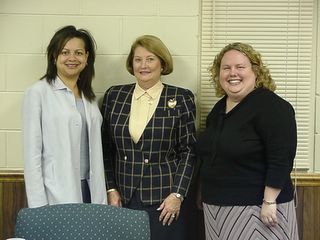PRESS RELEASE FROM MARTING COMMUNITY COLLEGE
Studied by National Social Policy Group
Bertie County is served by Martin Community College. MCC is the smallest of four community colleges in North Carolina and among the smallest of 35 colleges nationally that have received $400,000 Lumina Foundation funding.
The others in North Carolina are in Goldsboro, Durham and Greensboro. Each site endeavors to demonstrate various interventions that can improve both enrollment access and the success rate of students.
“Lumina has awarded MCC a $400,000 grant and has reviewed our undertakings by sending us two specialists from a national research organization focused on social policy,” announced Academic and Student Services Dean Phyllis Broughton.
 Dr. Susan Gooden (left) and Kasey Martin (right) are shown with Dr. Mary Cauley at Martin Community College as they review activities linked to MCC's $400k "Achieving the Dream" grant from Lumina Foundation
Dr. Susan Gooden (left) and Kasey Martin (right) are shown with Dr. Mary Cauley at Martin Community College as they review activities linked to MCC's $400k "Achieving the Dream" grant from Lumina Foundation
“They were here April 26 and 27 meeting with administrators, faculty and staff to study our activities being undertaken as part of MCC’s ‘Achieving the Dream’ (AtD) initiative.”
“The annual review is conducted on behalf of Lumina Foundation to learn from progress the college is making,” noted MCC’s grant coordinator Dr. Mary Cauley. “The funds are to be allocated over four years, with prospects for renewals. It’s a big deal for a small college.”
The New York office of MDRC, known from 1974 to 2003 as Manpower Demonstration Research Corporation, gathered feedback using analysts Dr. Susan Gooden and Kasey Martin from Virginia Commonwealth University in Richmond.
Dr. Jon Wiggs, chair of the Department of College Transfer and Developmental Education, put the social policy concern in perspective. He observed, “The Lumina grant addresses the role of the 1,200 community colleges in the U.S. regarding underserved groups.”
“Our local two-year institutions enroll more than 11.5 million students, nearly half of all undergraduates. Plus, community colleges attract high proportions of low-income, minority and first-generation students.”
Don Schork, chair of MCC’s AtD Data Team, explained, “The key measures are percentages of students (a) moving from remedial to credit courses, (b) enrolling and completing gatekeeper courses, (c) completing courses with a C or better, (d) re-enrolling from one semester to the next, and (e) earning certificates, diplomas and/or degrees.”
MDRC is seen as a source of objective, unbiased evidence in fields where emotion and ideology often dominate public debates. From welfare policy to high school reform, its research has frequently helped to shape legislation, program design, and operational practices across the country.
“Within a few weeks the college will receive feedback from these two analysts, as well as from those other analysts visiting other institutions around the country,” concluded Wiggs. “The information will then be shared throughout the community with civic, social and service agencies, and with media. We are trying to continuously improve the quality of related MCC services.”


